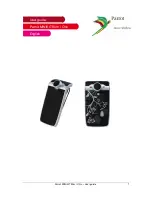
For Your Safety
120
The FCC has granted an Equipment Authorization for this model phone with
all reported SAR levels evaluated as in compliance with the FCC RF emission
guidelines. SAR information on this model phone is on file with the FCC and
can be found under the Display Grant section of
fccid after searching on FCC ID ZNFVS501. Additional information on Specific
Absorption Rates (SAR) can be found on the Cellular Telecommunications
Industry Association (CTIA) website at
http://www.ctia.org/.
* In the United States and Canada, the SAR limit for mobile phones used
by the public is 1.6 watts/kg (W/kg) averaged over one gram of tissue.
The standard incorporates a substantial margin of safety to give additional
protection for the public and to account for any variations in measurements.
FCC Hearing-Aid Compatibility (HAC)
Regulations for Wireless Devices
On July 10, 2003, the U.S. Federal Communications Commission (FCC) Report
and Order in WT Docket 01-309 modified the exception of wireless phones
under the Hearing Aid Compatibility Act of 1988 (HAC Act) to require digital
wireless phones be compatible with hearingaids. The intent of the HAC Act
is to ensure reasonable access to telecommunications services for persons
with hearing disabilities. While some wireless phones are used near some
hearing devices (hearing aids and cochlear implants), users may detect a
buzzing, humming, or whining noise. Some hearing devices are more immune
than others to this interference noise, and phones also vary in the amount of
interference they generate.
The wireless telephone industry has developed a rating system for wireless
phones, to assist hearing device users to find phones that may be compatible
with their hearing devices. Not all phones have been rated. Phones that are
rated have the rating on their box or a label located on the box.
The ratings are not guarantees. Results will vary depending on the user’s
hearing device and hearing loss. If your hearing device happens to be
vulnerable to interference, you may not be able to use a rated phone
successfully. Trying out the phone with your hearing device is the best way to
evaluate it for your personal needs.
M-Ratings: Phones rated M3 or M4 meet FCC requirements and are likely
to generate less interference to hearing devices than phones that are not
labeled. M4 is the better/higher of the two ratings. T-Ratings: Phones rated T3
or T4 meet FCC requirements and are likely to generate less interference to
hearing devices than phones that are not labeled. T4 is the better/ higher of
Summary of Contents for K20 LG-RS501
Page 6: ...Custom designed Features 01 ...
Page 13: ...Basic Functions 02 ...
Page 49: ...Useful Apps 03 ...
Page 83: ...Phone Settings 04 ...
Page 103: ...Appendix 05 ...
Page 111: ...For Your Safety 06 ...
Page 141: ...LIMITED WARRANTY STATEMENT 07 ...
Page 148: ......
















































